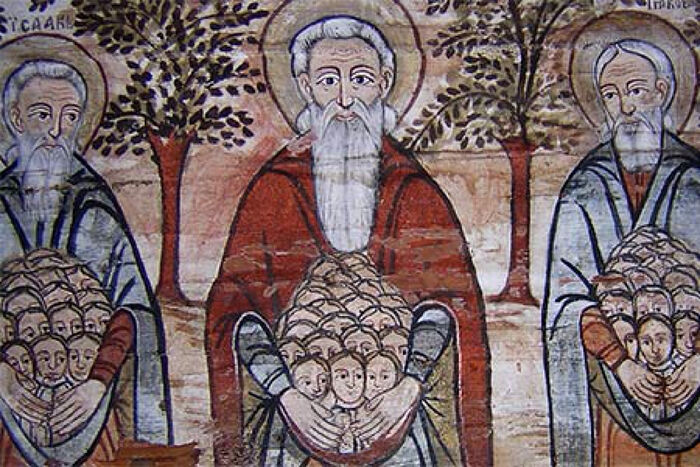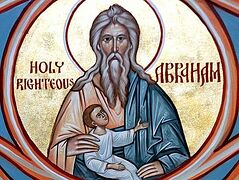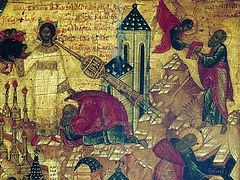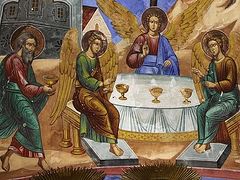On August 21/September 3, the Church commemorates the Old Testament Patriarchs and Forefathers Abraham, Isaac, and Jacob.
 Patriarchs Abraham, Isaac, and Jacob. Photo: vjeraidjela.com
Patriarchs Abraham, Isaac, and Jacob. Photo: vjeraidjela.com
***
Through the mouth of the Apostle Paul, the Church reminds us of the Divine promises given by God to Abraham: Surely blessing I will bless thee, and multiplying I will multiply thee (Heb. 6:14). Naturally, this begs the question: What do the promises given by God to the progenitor of the Jewish people more than 3,000 years ago have to do with modern man?
First of all, let’s note the fact that St. Paul doesn’t quote the promises to Abraham in full, but only gives one line, knowing that such an important point in Scripture was undoubtedly well known to any Jew and that there was no need to quote the entire text. This promise is taken from Genesis chapter 22, where Abraham’s willingness to sacrifice Isaac is described: By myself have I sworn, saith the Lord, for because thou hast done this thing, and hast not withheld thy son, thine only son: That in blessing I will bless thee, and in multiplying I will multiply thy seed as the stars of the heaven, and as the sand which is upon the sea shore; and thy seed shall possess the gate of his enemies; And in thy seed shall all the nations of the earth be blessed; because thou hast obeyed my voice (Gen. 22:16-18).
Most of the promise refers not so much to Abraham himself as to his “seed.” This word is used with various shades of meaning in the Bible. In this case, it has three main meanings.
First of all, it’s the Israelite people, who descended from Abraham. Then, Christians, according to the word of the Apostle: And if ye be Christ’s, then are ye Abraham’s seed, and heirs according to the promise (Gal. 3:29). The third meaning points to the Messiah who was to come from Abraham—to Jesus Christ, the Son of God, and son of Abraham (Lk. 3:38, Mt. 1:1). Christ is also called “seed” at the beginning of the book of Genesis, in the episode of God’s judgment over the serpent: And I will put enmity between thee and the woman, and between thy seed and her seed; it shall bruise thy head, and thou shalt bruise His heel (Gen. 3:15).
Thy seed shall possess the gate of his enemies—this isn’t just about the conquest of Palestine by the Israelites, but also about the victory of Christ over hell and the devil. For He hath broken the gates of brass, and cut the bars of iron in sunder (Ps. 106:16), the Psalmist sings about this victory.
And in thy seed shall all the nations of the earth be blessed. “Blessed in thy seed” means “blessed in Christ.” In Christ, all people again receive the favor and blessing of the Father that was lost in the Fall. Unbelievers receive it as a possibility, but those who believe and abide in the Church—as a reality and action.
So, we see that the promise, partially quoted by St. Paul, directly concerns us, Christians, people of the Church. Moreover, Abraham himself didn’t see the fulfillment of the promise to the end—it was revealed and fulfilled precisely in the Church of Christ. It was fulfilled in us! That’s why St. Paul reminds Christians about this promise, so that we might have a strong consolation, who have fled for refuge to lay hold upon the hope set before us: Which hope we have as an anchor of the soul, both sure and stedfast (Heb. 6:18-19).
The Apostle compares hope to an anchor, which, as everyone knows, holds a ship steadfast despite the movement of the waters. The deeper the anchor sinks into the ground, the more stable the ship. If an anchor heads for the ground, then where is our hope directed? It entereth into that within the veil; Whither the forerunner is for us entered, even Jesus, made an high priest for ever after the order of Melchisedec (Heb. 6:19-20). What does this mean?
Unlike the High Priests of the Old Testament, who entered the Holy of Holies of the earthly tabernacle with the sacrificial blood but once a year, Jesus the High Priest entered into the Heavenly tabernacle once in the history of the world and offered His Blood for the sins of all.
Note that the Old Testament Temple (and the Tabernacle before it) was divided into three parts: the Holy of Holies, the sanctuary, and the courtyard. The Holy of Holies was separated from the sanctuary by a veil. This is the “within the veil” that the Apostle talks about, only now referring to the Heavenly tabernacle, which the Lord pitched, and not man (Heb. 8:2). Jesus entered there as the “forerunner,” meaning He opened the way for us as well. That’s why, by the way, the veil was rent in the Jerusalem Temple when Jesus gave up the spirit (Mt. 27:51). This was a great sign, about which the Biblical commentator Euthymios Zigabenos says: “As the inner side of the veil served as an image of Heaven, and the outer as an image of the earth, the rending of the veil meant the barrier between Heaven and earth, that is, the enmity between God and man, was torn, and that Heaven has become accessible to man, because Jesus Christ, having destroyed this barrier, restored this access to us” (Commentary on Mt. 27).
It is precisely there, to Heaven, to the Heavenly Tabernacle, to within the veil that our hope should stretch forth, brothers and sisters. It is there that the ship of our life, shaken on all sides by the waves of daily storms, should toss its anchor. For we are all strangers and pilgrims on earth, For here have we no continuing city, but we seek one to come (Heb. 13:14). And what is the coming city? It is the holy city, new Jerusalem, coming down from God out of Heaven, prepared as a bride adorned for her husband, having no need of the sun, neither of the moon, to shine in it: for the glory of God did lighten it, and the Lamb is the light thereof (Rev. 21:2, 23).
All of our hope and our thoughts should strive to go there, “to the Heavenly… to the Heavenly… to the light…,” as said the dying St. Gregory Palamas. There God shall wipe away all tears from their eyes; and there shall be no more death, neither sorrow, nor crying, neither shall there be any more pain: for the former things are passed away (Rev. 21:4). Let us turn our hope there and let us believe: It will not put us to shame, for the promises of God are immutable.
So much we find in this Apostolic reading—consolation, and admonition, and hope, and encouragement, and a reminder of the promises. Such is the word of God, given by inspiration of God, and profitable for doctrine, for reproof, for correction, for instruction in righteousness (2 Tim. 3:16). Let us stock up on the precious seeds of the word of God that in time they might sprout into spiritual fruit, which is love, joy, peace, longsuffering, gentleness, goodness, faith, Meekness, temperance (Gal. 5:22-23). May we ourselves be the true seed of Abraham and heirs of all the promises of God (cf. Gal. 3:29).



